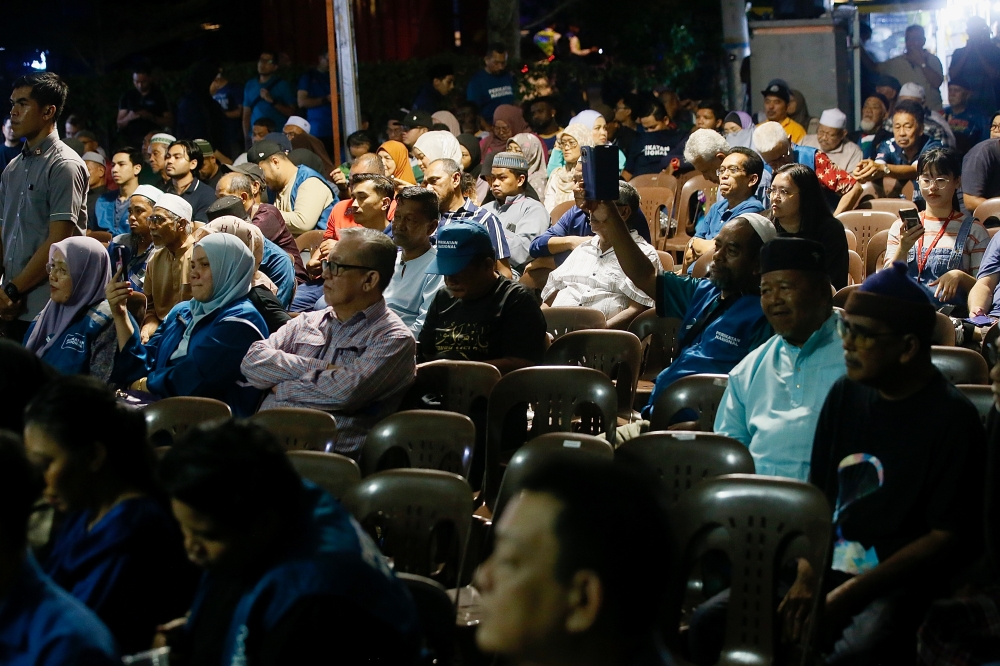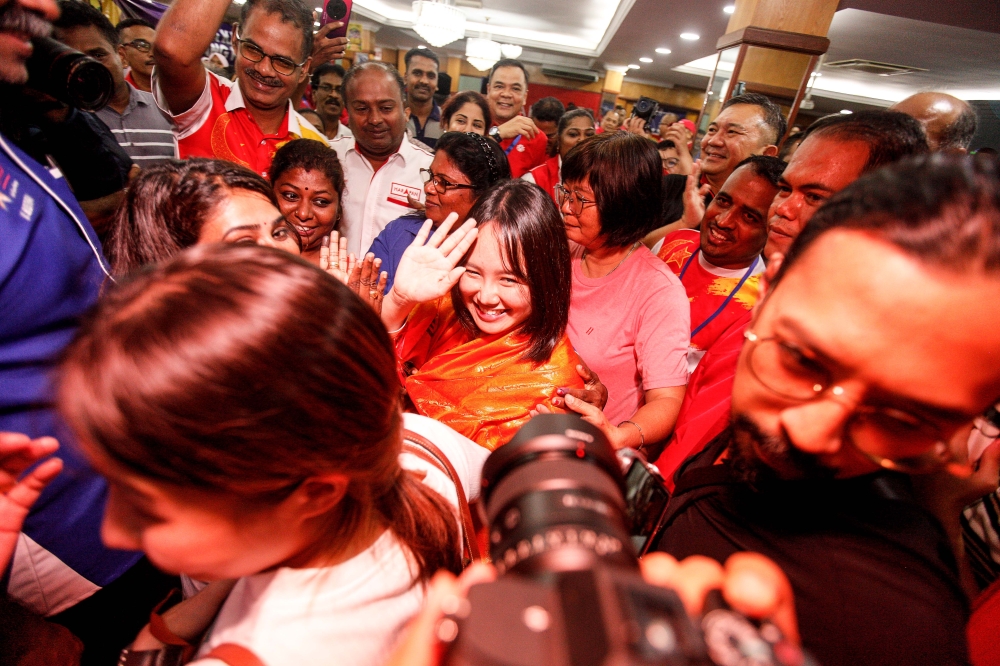Three things we learnt from: The Kuala Kubu Baru by-election

General shots of Kuala Kubu Bharu landmark in Kuala Kubu Bharu on May 6, 2024. — Picture by Shafwan Zaidon
Sunday, 12 May 2024 7:00 AM MYT
HULU SELANGOR, May 12 — Yesterday, Kuala Kubu Baru voters went to the ballots again for the second time in less than a year after the death of Pakatan Harapan's Lee Kee Hiong in March.
Her successor representing the PH-Barisan Nasional unity coalition, Pang Sock Tao, was declared the winner with a majority of 3,869 votes — slightly lower than Lee's 4,119.
The former press secretary to the Housing and Local Government Minister polled 14,000 votes to beat Perikatan Nasional (PN) candidate Khairul Azhari Saut, who obtained 10,131 votes.
The other two candidates from Parti Rakyat Malaysia and the independent did not even receive 200 votes each.
Analysts polled by Malay Mail had called the result prior to the election, and the predicted status quo was one of the reasons why this poll was not generally considered exciting.
Here are some takeaways by our team from the campaigning:

Sunday, 12 May 2024 7:00 AM MYT
HULU SELANGOR, May 12 — Yesterday, Kuala Kubu Baru voters went to the ballots again for the second time in less than a year after the death of Pakatan Harapan's Lee Kee Hiong in March.
Her successor representing the PH-Barisan Nasional unity coalition, Pang Sock Tao, was declared the winner with a majority of 3,869 votes — slightly lower than Lee's 4,119.
The former press secretary to the Housing and Local Government Minister polled 14,000 votes to beat Perikatan Nasional (PN) candidate Khairul Azhari Saut, who obtained 10,131 votes.
The other two candidates from Parti Rakyat Malaysia and the independent did not even receive 200 votes each.
Analysts polled by Malay Mail had called the result prior to the election, and the predicted status quo was one of the reasons why this poll was not generally considered exciting.
Here are some takeaways by our team from the campaigning:

A crowd listening the Ceramah Umum Perikatan Nasional in Kuala Kubu Baharu April 30, 2024. — Picture by Hari Anggara
1. Voter fatigue is real — so what's next?
While it may seem like campaigning was fiery on social media platforms, the reality on the ground was very much different.
When approached by Malay Mail, several residents here were not keen to talk about politics, citing sensitivity as the reason for opting out of the conversations. The locals seemingly like the town as it is: Serene and peaceful.
Perikatan Nasional (PN) had attempted to drum up support by lining up several top leaders to speak at one of the night ceramahs, but instead it had to start 30 minutes later than scheduled due to the many empty seats. Crowds only started to form when former Selangor menteri besar Datuk Seri Azmin Ali took the stage, but even then it was hardly a large crowd.
The final voter turnout was 61.51 per cent. It was among the lowest for by-elections after the 15th general election.
Nusantara Academy for Strategic Research (NASR) senior fellow Azmi Hassan told Malay Mail that voters have started showing signs of election fatigue.
"Not only that, but they don’t see the urgency of going out to vote because nothing will change. It’s the politicians who have a point to prove,” he said.
This was especially true in KKB — this was the third election in three years after the 15th general election in 2022 and the Selangor state election last year.
2. Indian community at forefront here, but are they now kingmakers?
While the constituency is predominantly Malay, both PH and PN were chasing the votes of the Indian community.
In the semi-urban constituency in Selangor of roughly 40,000 voters, Malays make up some 49.6 per cent of the electoral roll compared to the ethnic Chinese (30.6 per cent), ethnic Indians (18 per cent) and others (2.1 per cent).
According to pollster Ilham Centre's survey, while Malay voters seemingly sided with PN and vice versa with the Chinese community and PH, the ethnic Indians could be the "kingmakers".
The minority community's support for PH has been waning, due to the perception that they have been taken for granted by the ruling government, and that their needs are not being met.
Seeing this as an opportunity, PN was honing in on the 7,200 Indian voters here, knowing that it was unlikely to get any support from the Chinese.
In an apparent effort to broaden its appeal among non-Malay voters, PN also recently welcomed the Malaysian Indian People’s Party (MIPP) into its ranks as its newest component, led by former MIC leader P. Punithan, who was also appointed as a deputy chairman of the PN coalition.
It remains to be seen whether this trend will continue in future by-elections, and whether the Indian community will reap any rewards over this.

1. Voter fatigue is real — so what's next?
While it may seem like campaigning was fiery on social media platforms, the reality on the ground was very much different.
When approached by Malay Mail, several residents here were not keen to talk about politics, citing sensitivity as the reason for opting out of the conversations. The locals seemingly like the town as it is: Serene and peaceful.
Perikatan Nasional (PN) had attempted to drum up support by lining up several top leaders to speak at one of the night ceramahs, but instead it had to start 30 minutes later than scheduled due to the many empty seats. Crowds only started to form when former Selangor menteri besar Datuk Seri Azmin Ali took the stage, but even then it was hardly a large crowd.
The final voter turnout was 61.51 per cent. It was among the lowest for by-elections after the 15th general election.
Nusantara Academy for Strategic Research (NASR) senior fellow Azmi Hassan told Malay Mail that voters have started showing signs of election fatigue.
"Not only that, but they don’t see the urgency of going out to vote because nothing will change. It’s the politicians who have a point to prove,” he said.
This was especially true in KKB — this was the third election in three years after the 15th general election in 2022 and the Selangor state election last year.
2. Indian community at forefront here, but are they now kingmakers?
While the constituency is predominantly Malay, both PH and PN were chasing the votes of the Indian community.
In the semi-urban constituency in Selangor of roughly 40,000 voters, Malays make up some 49.6 per cent of the electoral roll compared to the ethnic Chinese (30.6 per cent), ethnic Indians (18 per cent) and others (2.1 per cent).
According to pollster Ilham Centre's survey, while Malay voters seemingly sided with PN and vice versa with the Chinese community and PH, the ethnic Indians could be the "kingmakers".
The minority community's support for PH has been waning, due to the perception that they have been taken for granted by the ruling government, and that their needs are not being met.
Seeing this as an opportunity, PN was honing in on the 7,200 Indian voters here, knowing that it was unlikely to get any support from the Chinese.
In an apparent effort to broaden its appeal among non-Malay voters, PN also recently welcomed the Malaysian Indian People’s Party (MIPP) into its ranks as its newest component, led by former MIC leader P. Punithan, who was also appointed as a deputy chairman of the PN coalition.
It remains to be seen whether this trend will continue in future by-elections, and whether the Indian community will reap any rewards over this.

Newly-elected Assemblymen Pang Sock Tao was seen leaving the scene after the announcement of the winner of the N.06 Kuala Kubu Bharu By-Election here at Kuala Kubu Bharu Umno office, May 11, 2024. — Picture by Sayuti Zainudin
3. Perikatan’s identity politics rejected once again
Pang’s triumph was expected by several political observers who felt that Perikatan Nasional’s campaign, which harped on Malay-Muslim issues, was deemed ineffective in a mixed ethnic seat in Selangor.
llham Centre, for example, had said PN’s approach had reached the saturation point and highlighted that the pact is not campaigning in Malay-majority Kelantan, Terengganu or Kedah.
PN Deputy Chairman Datuk Seri Ahmad Faizal Azumu denied this commentary, saying that the reception it received from the grassroots here did not reflect the observation.
"If you want to say that we are saturated, we can see here, from my own personal experience, when we go down to the field, the support is so good and every time we walk from house to house we are greeted so well.
"They have given feedback and they have encouraged us to work harder to win the upcoming elections,” he said in a press conference last night.
In the run-up to the campaign period, PN component parties had somewhat argued with each other as Gerakan wanted to maintain its position as a candidate in the seat last year
However, PN election director Datuk Seri Muhammad Sanusi Md Nor insisted that a Malay candidate should be fielded as it would have given them a better chance of securing a win.
PAS information chief Ahmad Fadhli Shaari's strategy of highlighting Pang’s vernacular school background may similarly have backfired.
So far, PN had only managed to win three by-elections since 15th general election: one of them back in 2022, and the other two were in Terengganu where PAS was incumbent.
Will this now force PN to change tack?
3. Perikatan’s identity politics rejected once again
Pang’s triumph was expected by several political observers who felt that Perikatan Nasional’s campaign, which harped on Malay-Muslim issues, was deemed ineffective in a mixed ethnic seat in Selangor.
llham Centre, for example, had said PN’s approach had reached the saturation point and highlighted that the pact is not campaigning in Malay-majority Kelantan, Terengganu or Kedah.
PN Deputy Chairman Datuk Seri Ahmad Faizal Azumu denied this commentary, saying that the reception it received from the grassroots here did not reflect the observation.
"If you want to say that we are saturated, we can see here, from my own personal experience, when we go down to the field, the support is so good and every time we walk from house to house we are greeted so well.
"They have given feedback and they have encouraged us to work harder to win the upcoming elections,” he said in a press conference last night.
In the run-up to the campaign period, PN component parties had somewhat argued with each other as Gerakan wanted to maintain its position as a candidate in the seat last year
However, PN election director Datuk Seri Muhammad Sanusi Md Nor insisted that a Malay candidate should be fielded as it would have given them a better chance of securing a win.
PAS information chief Ahmad Fadhli Shaari's strategy of highlighting Pang’s vernacular school background may similarly have backfired.
So far, PN had only managed to win three by-elections since 15th general election: one of them back in 2022, and the other two were in Terengganu where PAS was incumbent.
Will this now force PN to change tack?
No comments:
Post a Comment